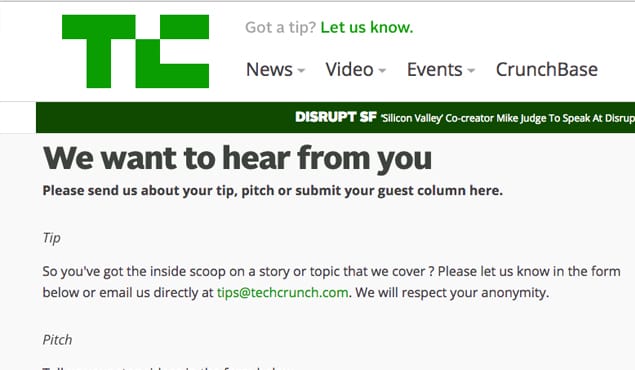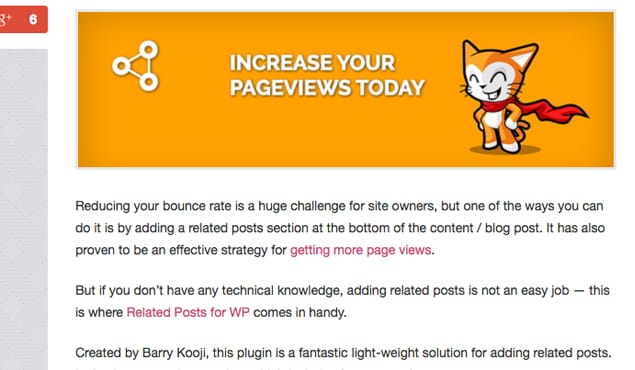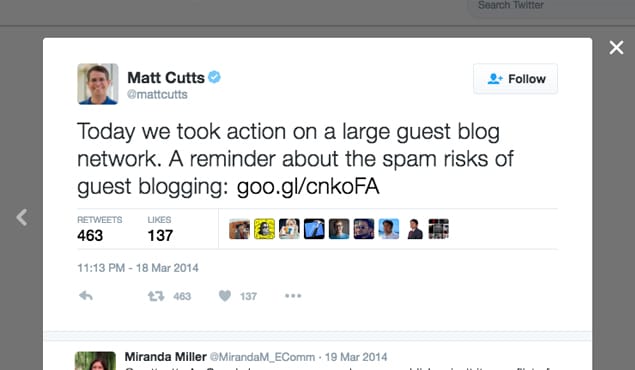If you do a Google search on “guest posting” you’ll find two competing views. Some say it’s a terrible, corrupt and even dangerous way to increase the scope of your brand and blog. Others claim it’s a tactic sent from the heavens that boosts your search engine rankings to incalculable heights.
The reality is that both are right. Kind of. The middle line is the road to walk when it comes to guest posting because while both of those extremes can occasionally be true, you will more often find the results of your guest posting efforts to be decently effective.
Confused? I was too.
It’s a bit strange that typing a search term into Google pulls up a variety of authoritative, well-composed articles on one subject that can say such different things.
My goal is to set the record straight on guest posting, because it is still a valuable way to spend your time, but when done incorrectly can lead to seriously negative results.
In setting the record straight I will address the many faceted components that makes guest posting the complicated topic it is today, and how you, the potential guest poster, can proceed with knowledge.
If you’re a TL;DR type of browser, this article title should satisfy you perfectly — guest posting definitely still works, as long as the articles and publishers are quality.
Guest Post Basics
You’re here to get the skinny on guest posting, and that’s just what I’m going to give you (in a macabre, film-noir style too, so imagine me talking to you in a dark room with a pipe and lacquered wood desk between us).
Now that the mood’s set, I’ll lay out the absolute basics.
Guest posting is when you write an article and get it published on another blog. Not your own blog, but a blog that is related to your field in some way.
Much like a pro athlete receives more than that Olympic gold medal in terms of sponsorships, honors, and a career path, you will receive some excellent benefits from getting a guest post accepted:
- Your byline. This is your good and excellent name attached to words written in stone (er, the Internet, which can be snapshotted), so make sure you like your words.
- Exposure. Guest posting opens the doors to new readers who may (or may not, depending on your skills) check out your website and begin to follow your business.
- Connections. The blog industry is all about connections, and every time you write a guest post you establish one.
- A backlink. This is the money. The real reason people write guest posts is to establish a backlink to their own website, thereby receiving Google “juice”, which boots your site rankings.
Each of these is an integral piece of how and why guest posting can still work, and why it sometimes doesn’t. You have to take all your salt and divide it into little grains, because guest posting really is about towing that central line.
Google’s Stance
Part of the reason this is such a hotly debated topic is that Google, the search giant that eats URLs for breakfast like a spider ten times the size of Shelob, actually has an opinion on this.
The leading voice of the naysayers in the guest posting world is Matt Cutts, a former Google employee. Cutts wrote a now-famous article in 2014 that declared guest posting dead — using such inflammatory language as “stick a fork in it, it’s done“.
This marked the beginning of the movement for those that declaratively moved away from guest posting.
You see, along with Cutt’s blog post (which appeared on his own site), came the news that Google algorithms, the very same that judge how and why an article appears on the first, second, third, etc. page of Google, would take into account the validity of guest posts.
To make a complicated matter quite short — in 2014 Google’s algorithms were going to target guest posts and guest post-related sites and decrease their rankings in search.
The Backlink
To understand this fully, you’ve got to know that the real power of the backlink comes from the search engine perspective, particularly Google’s search engine.
The company founded its search algorithms on the idea that the more websites that linked to your site as a resource, the higher your website or article would rank. This is very basic, and has gotten extremely multi-faceted since its inception, but that’s still the underlying principle.
Guest posts showed up as amazing way to get a backlink. Hundreds of them. Thousands. If you don’t care who publishes your guest post you could write five sloppy 300 word articles a day, send them out with an automated software program, get accepted by equally sloppy (i.e., shoddy, i.e., shitty) websites, and get yourself 25 backlinks a week.
Over time this builds and, without Google’s interference, you could easily have top-ranked articles for a given topic even if the quality of said articles were crap.
The Move Away from Guest Posts
After the Cutts’ article came out, something akin to all-hell-breaking loose occurred for bloggers. You see, people’s livelihoods depend on search engine rankings. High rankings means traffic, traffic means money, and money means food and shelter.
It wasn’t the article that did it, but Google’s subsequent algorithms that were very particular in how they counted types of backlinks. Most people that guest posted in that overly ambitious way had articles re-ranked way lower, while some received web-master bans from Google itself.
In a number of instances Google penalized people who guest posted through sites like MyBlogGuest. That site, which served as a hub for guest posters and (some would say) encouraged the frowned upon methods, was removed from the search engines altogether.
It was a dark time for the guest poster.
This is the point in our smoke-filled talk to pause, drink some brandy, and begin to tell the tale of a new hope and light.
Guest Posting Rises Again
The thing to remember from all this sordid history is that:
- It’s history. Things change.
- The Cutts article and Google’s algorithms were addressing the abusive aspects of guest posting, thereby making a clear definition of the “right” and “wrong” way to pursue the craft.
- Guest posting is still effective, and it’s here to stay.
I’ll focus on No. 3, because it’s heart-warming and what you came here to hear. This site is called Guestpost.com for a reason — it will always exist as a valuable tool in any writer’s, blogger’s, or business persons’ arsenal.
Just like social media, the guest post is one extra way for you to market yourself and your brand, but you need to do it in the right way. If you don’t, you’ll be subject to the wrath of Google’s algorithms.
How to Guest Post Correctly
The name of this article suggests two of the most important elements:
- A quality article.
- A quality publisher.
As a guest poster both of these depend on you. You’re going to write the article, and you’re going to send out the pitch for the article to a publisher. So, take notes, because you’ll want to do this correctly in order to be considered legitimate in this field. The other option is to be grouped into the spam-category, and that’s never pleasant.
Elements of a Quality Article
You should notice a couple elements this article includes and, yes, you can use it as an example of a “quality” article.
Here’s what you should aim for.
- Well-structured. You’ll always want to follow the guidelines and styles of the site you are trying to get published on, but the standard format for blog articles in 2016 is an introduction and formatted areas of content separated by different headers. You’ll also want to use numbered and bulleted lists to help the reader figure out where the information is.
- Well written. There’s no need to pen the most epic of posts ever written, but using the correct grammar, spelling, and tone are key to a quality article.
- Salient links. This is one of the most important steps! You want to include 2-10 links in your article (depending on length) that help your reader. Links should provide more detail on certain topics that, when clicked by the reader, illuminate that topic in an excellent and relevant way. Including links to your own website or to websites that you are “affiliated” with but provide no helpful information is a major offense. Not just to your reader, but to Google
- True. As in factual. Don’t go spewing a bunch of nonsense on the Internet. There’s enough of that. Write with precision and command on your topic, and if you aren’t sure about something, do the research to get your answers.
The above are guidelines for writing an article that is high-quality for your readers, but there’s more at stake than your readers. There are the search engines to consider.
The salient links point is one I can’t stress enough (imagine me pounding a fist on the desk). If you provide poor links in your article Google will ding the website that published your article. This may sound like a joyride to you — Google won’t punish you directly — but it’s incredibly bad form to slip links in past an editor for your own gain.
This goes right into choosing a quality publisher, which is just as important as submitting a quality article.
Elements of a Quality Publisher
In many ways picking (and getting accepted by) a publisher will actually be more important than what you write. I know that sounds strange, but the world of blogging is one of rankings and reaching a broad audience.
If you have a truly revolutionary thing to say in your article, great. Hopefully it will get picked up by a larger publisher. But if you write that article and get it accepted by some spammy site that does nothing for your numbers or brand, what’s the point?
So, picking your publishers is important.
You want to check a number of factors when considering a publisher:
- Domain Authority. Where does the site rank on the web? This is a great metric to determine the level of credibility the site has. Anything over 30 is decent, sites above 70 are amazing.
- Traffic. You can use a number of tools to get data on the sites you want to publish on. These will show you how much traffic a site receives, where they get that traffic, and how much they make off the traffic. Obviously you want to publish on a site with high traffic.
- Social shares. This is a newer metric, but is still important. Do the articles have shares on social media? While this isn’t necessary if a site has plenty of traffic and ranks highly, social shares show there is an active community. If you want to build your community, gravitate toward these sites, because they’ll be excellent at helping you grow.
- Quality of articles. Just like you want to submit a quality article, make sure their articles are quality. If you visit a publisher and their English is terrible, the links they include are spammy, and there is no author information, don’t write for them.
- A big name. Sometimes publishers have a great repertoire of writers, sometimes they have one big figure. If you’re able to connect with that big player the rewards will be huge.
All of this comes after you’ve dialed into publishers that fit in your niche, which is the most relevant aspect of this. Don’t pitch a publisher that has a totally different niche — it’s a waste of time and looks like you don’t know what you’re doing.
Synthesis, Synergy, and Syn-ness
I’m a big fan of closing out topics with syn-based words because it implies we are all working together on something. Syn is also a Greek root that means “together,” so there’s that, too.
The key to the history I’ve described above, and the outline of quality articles and publishers, is that you need to approach guest posting seriously. Do it for all the right reasons, because even a number of the right reasons are kind of greedy.
You want backlinks, you want your search rank to rise, you want recognition in your community. All of that is possible and totally valid with guest posting, but not if you go the route of spammers, poor links, and poorly written articles.
With that in mind, know that guest posting still works, and will likely always work. Who doesn’t want an expert friend writing for their site?
I know I do.
 ContentPowered.com
ContentPowered.com









